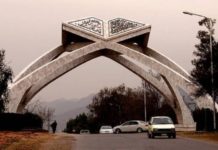The oligarchy which runs Pakistan, often called the establishment, is in a quandary. The problem is that whatever it says through its diplomats abroad — and with however much energy — the world insists on perceiving Pakistan as an ideological state wedded to exporting jihad. This is undesirable, but so also is the idea of changing course.
Writing in this newspaper, Ambassador Munir Akram admits that Pakistan has “few friends and many enemies” in Washington. Indeed, Trump’s victory can only worsen matters. But Europe, Russia, and Japan also see things similarly. Few there would be impressed by Akram’s frank admission that, “Lashkar-e-Taiba and Jaish-e-Mohammed participated in the legitimate post-1989 Kashmiri freedom struggle”, do not attack Pakistan, and “enjoy a degree of popular support” — or with his suggestion that no action be taken against such groups until things improve in Kashmir.
Akram’s views likely reflect the current thinking of a powerful section of the establishment. But what precisely is the establishment? Who can belong to it, and what does it want?
Missing from the establishment’s perception of national interest is a positive vision for Pakistan’s future.
From Pakistan’s birth onwards, the establishment has set Pakistan’s international and domestic postures, policies, and priorities. Today it rules on the extent and means by which India and America are to be confronted, and how China and Saudi Arabia are to be wooed. It sanctions, as well as limits, militant proxy forces for use across borders; closely controls what may or may not be discussed in the public media; and determines whether Balochistan or Sindh is to be handled with a velvet glove or banged with an iron fist.
Establishment members are serving and retired generals, politicians in office and some in the opposition, ex-ambassadors and diplomats, civil servants, and selected businessmen. The boundaries are fluid — as some move in, others move out. In earlier days English was the preferred language of communication but this morphed into Urdu as the elite indigenised, became less cosmopolitan, and developed firmer religious roots.
Arguably, most forms of government anywhere are reducible to the rule of a few. In Pakistan’s case how few is few? In 1996 Mushahid Husain, long an establishment insider and currently a senator, had sized the establishment at around 500 persons plus a list of wannabes many times this number.
Stephen Cohen, an astute observer of Pakistani politics over the decades, remarks that establishment membership is not assured even for those occupying the highest posts of office unless they have demonstrated loyalty to a set of “core values”. That India is Pakistan’s archenemy — perhaps in perpetuity — is central. As a corollary, nuclear weapons are to be considered Pakistan’s greatest asset and extra-state actors an important, yet deniable, means of equalising military imbalances. These, and other, assumptions inform Pakistan’s ‘national interest’.
National interest means differently in different countries. For example the post-War American establishment considered the export of American values — particularly free trade — as America’s national interest. Stalin’s Russia and Mao’s China competed to implant their respective brands of communist ideology overseas. On the other hand today’s China is purely pragmatic. So is India. Not being ideological states, they are not mission-driven. They just want to be modern, rich, powerful, and assertive.
Let’s compare Pakistan’s national interest with the above. Just what is it in the eyes of its establishment? In search of an answer, I recently browsed through theses and articles in various departments of universities, including the National Defence University in Islamabad.
What I found was unsurprising. National interest is defined exclusively in relation to India. This means resolving Kashmir on Pakistan’s terms, ensuring strategic depth against India via a Talibanised Afghanistan, nurturing the Pakistan-China relationship to neutralise Indian power, etc. To “borrow” power through military alliances against India is seen as natural. Hence, switching from America’s protection to China’s happened effortlessly.
Missing from the establishment’s perception of national interest is a positive vision for Pakistan’s future. I could not find any enthusiastic call for Pakistan to explore space, become a world leader in science, have excellent universities, develop literature and the arts, deal with critical environmental issues, achieve high standards of justice and financial integrity, and create a poverty-free society embodying equalitarian principles.
This lopsided view has distorted Pakistan’s priorities away from being a normal state to one that lives mentally under perpetual siege. To its credit, Nawaz Sharif’s government attempted — albeit only feebly — to make a break and concentrate on development. It knows that the use of covert jihad as an instrument of state policy has isolated Pakistan from the world community of nations, including its neighbours. Diplomats tasked to improve the national image are rendered powerless by the force of facts.
Keeping things under wraps has become terribly hard these days. For example, Pakistan denies any involvement in the Uri attack. But, to commemorate the dead attackers, Gujranwala city was plastered with Jamaatud Dawa posters inviting the public to funeral prayers, to be led by supremo Hafiz Saeed on Oct 25, for the martyred jihadists who had “killed 177 Hindu soldiers”. I did not see any Pakistani TV channel mention this episode. The posters were somehow quickly removed but not before someone snapped and uploaded them on the internet.
To conclude: while the rise of the hardline anti-Muslim Hindu right and India’s obduracy in Kashmir is deeply deplorable, it must be handled politically. One cannot use it to rationalise the existence of non-state militant groups. Such groups have taken legitimacy away from those fighting Indian rule in Kashmir. They have also turned out to be a menace to Pakistan’s society and armed forces.
Today’s crisis of the establishment can lead to positive change provided gut nationalism is subordinated to introspection and reflection. It is a welcome sign that a significant part of the establishment — the Nawaz Sharif government — is at least aware of the need for Pakistan to reintegrate itself with the world. Concentrating on our actual needs is healthier than worrying about matters across our borders. One can only hope that other parts of the establishment will also see this logic.







